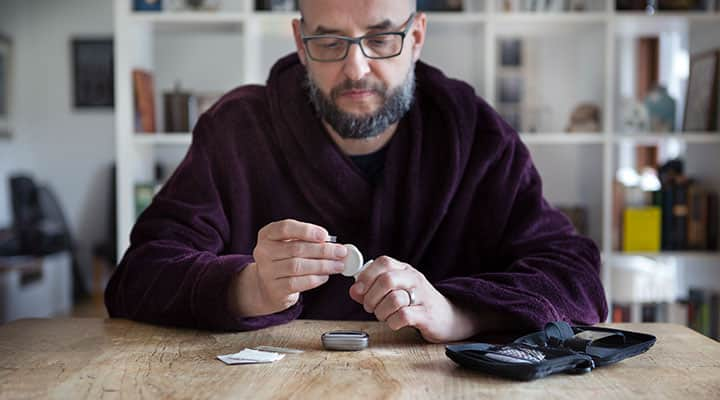
Vitamin D for Childhood Diabetes: How Can It Help?
Vitamin D for Childhood Diabetes: How Can It Help?
A strange phenomenon sometimes happens when a patient is diagnosed with type 1 diabetes mellitus. Right after their symptoms start to show—indicative of a disease that they were probably told would be lifelong—those same symptoms begin to lessen or even disappear completely.
While it may sound like fiction, in juvenile-onset diabetes, healthcare providers call this the "honeymoon phase," which is really a remission period. But in actuality, it has to do with how the body initially responds to insulin injections—a reaction that changes over time. Unfortunately, this vacation from symptoms doesn't last.
There's good news, though. A new study published in JAMA found that the honeymoon phase can be extended by giving the patient high doses of vitamin D2 (a prescription form of vitamin D, also called ergocalciferol), which can help to maintain insulin production.
What’s the effect of vitamin D on type 1 diabetes?
The connection between diabetes and vitamin D is interesting, to say the least. In the clinical trial, 36 people between the ages of 10 and 21 (with an average age of 13.5) who were previously diagnosed with type 1 diabetes received (at random) either 50,000 IU of vitamin D as ergocalciferol per week for two months, then biweekly for 10 months, or a placebo.
The investigators in the controlled trial monitored the study subjects' proinsulin:C-peptide (PI:C) ratio, a biomarker of beta-cell dysfunction and an indication of the progression of type 1 diabetes. So what exactly were the effects of vitamin D? The participants in the clinical trial who received vitamin D2 demonstrated significantly decreased fasting PI:C compared to participants in the placebo group.
The participants also had a slower decline in another biomarker called %∆AUC C-peptide used to measure the progression of type 1 diabetes compared to the placebo group. Essentially, these participants exhibited greater protection of their beta-cell function.
In other words, participants who received high doses of vitamin D2 saw a longer "honeymoon phase" compared to the placebo group. Why is this important, exactly? This study shows that high-dose vitamin D2 is capable of prolonging this remission period. This means individuals with type 1 diabetes can experience better glycemic control and a decrease in long-term complications, making ergocalciferol a potential add-on therapy.
Diabetes Management Profile (Comprehensive) Blood Test
Can vitamin D help with diabetes?
This latest study isn't the only research suggesting that vitamin D might be beneficial for individuals dealing with diabetes. Many studies have linked vitamin D status and diabetes mellitus.
For example, one study found that the risk of gestational diabetes mellitus was significantly lower in pregnant women in their second trimester who had higher vitamin D levels (concentrations of more than 30 ng/mL).
This should be a relief for soon-to-be moms, as gestational diabetes can lead to a variety of health issues in the newborn, including excessive birth weight, pre-term birth, breathing problems, and obesity, as well as preeclampsia (high blood pressure during pregnancy) for mom. It can also increase the risk of a cesarean section.
Further research has even shown that vitamin D use was associated with better glycemic control in individuals with type 1 diabetes, pointing to the positive effects of higher vitamin D serum levels.
What about type 2 or prediabetes?
We've talked about type 1 diabetes a lot, but what else do we know about diabetes at large? The results of one large observational study suggest that higher vitamin D levels are associated with a lower risk of type 2 diabetes. Those with better vitamin D levels also had better lipid profiles, especially their triglycerides.
In another study, patients with type 2 diabetes who also had a vitamin D deficiency had poorer health in multiple ways, including compromised glycemic control, higher weight, altered renal function, anemia, and poorer iron values. This suggests that the role of vitamin D is prominent in not just the management of diabetes mellitus, but so much more.
Even in adults with prediabetes, higher vitamin D levels were shown in one study to reduce the risk of it progressing to diabetes. Another pleasant byproduct of getting a better handle on blood sugar? You'll help slow down the process of glycation, which can damage many different functions and systems of your body.
If you've been diagnosed with diabetes, or you're prediabetic, it's worth having a conversation with your healthcare provider about your vitamin D levels!
Should You Give Vitamin D to Children?
It's clear that vitamin D has benefits for all ages and most mainstream doctors do indeed recommend giving babies vitamin D starting shortly after birth and until they're at least one year old. This is because breastmilk doesn't provide enough of it on its own. Breastfed babies should get at least 400 IU of additional vitamin D per day. Formula-fed babies need at least 32 ounces of fortified formula daily to get the necessary amount of vitamin D. If they are not meeting those requirements, additional vitamin D is necessary.
Beyond infancy, research has found some links between vitamin D and overall health, but most information points to deficiency being linked to medical concerns, rather than using vitamin D in a preventative role.
In one observational study, children with type 1 diabetes had lower levels of vitamin D than healthy control groups. While this tells us that a vitamin D deficiency could be playing a role in diabetes for both adults and children and can help inform overall diabetes care for all ages. It is also important to note that children who are getting enough vitamin D from their diets and fortified foods may not require more. The decision to add extra vitamins should be a discussion between parents and their child's doctor.
Life Extension recommends more closely monitoring potential vitamin D deficiencies to help in the early diagnosis of diabetes and prevent serious complications down the line.
How can you improve insulin resistance and fight diabetes?
A vitamin D deficiency isn't the only thing to correct if you want to manage your insulin resistance. A few simple changes to your diet might help. For example, try munching on blueberries as a snack! The anthocyanin in blueberries offers unique health benefits, including potentially improving diabetes.
Another idea is to cook with turmeric, which contains the key bioactive compound curcumin. It can lower the fat in your blood, ultimately helping you get your blood glucose and insulin resistance under control. And insulin resistance is a central risk factor for diabetes, among other conditions. There are countless delicious recipes that use turmeric. Google is your best friend.
Additionally, there is research suggesting that vegetarians are less likely to have diabetes (and heart disease, for that matter). But if you're a meat-eater through and through, remember that even tiny changes can have a big impact. Try Meatless Mondays or swap your beef burger for a black bean burger any day of the week! You don't have to completely overhaul your diet to see a difference. Baby steps are key.
If you're feeling overwhelmed with trying to improve your diet and lifestyle choices, try sticking to the basics of glucose management: fill up on plants and whole foods, move your body, and up your intake of vitamins and minerals accordingly wherever food falls short.
The effects of vitamin D can't be ignored. It has an impact on insulin secretion and thus, diabetes, which can lead to further health complications in later years. If you're not sure if you're deficient, talk to your healthcare provider about checking your vitamin D serum levels. This can be done through a simple blood draw, and the results can help you take charge of your overall health.
References
- Ahola AJ, et al. "The use of dietary supplements, and the association between supplemental vitamin D and glycaemic control in adult individuals with type 1 diabetes." Diabet Med. May 2024. https://pubmed.ncbi.nlm.nih.gov/38356242/
- Albai O, et al. "Vitamin D-A New Therapeutic Target in the Management of Type 2 Diabetes Patients." J Clin Med. February 2024. https://pubmed.ncbi.nlm.nih.gov/38592202/
- Besser REJ, et al. "Exploring C-peptide loss in type 1 diabetes using growth curve analysis." PLoS One. 2018. https://www.ncbi.nlm.nih.gov/pmc/articles/PMC6029769/
- Dehzad MJ, et al. "Effects of curcumin/turmeric supplementation on lipid profile: A GRADE-assessed systematic review and dose-response meta-analysis of randomized controlled trials." Complementary Therapies in Medicine. August 2023. https://www.sciencedirect.com/science/article/pii/S0965229923000420
- Fu Y, et al. "Vitamin D status, vitamin D receptor polymorphisms, and risk of type 2 diabetes: A prospective cohort study." J Clin Endocrinol Metab. April 2024. https://pubmed.ncbi.nlm.nih.gov/38571313/
- Li DY, et al. "Maternal vitamin D status and risk of gestational diabetes mellitus in twin pregnancies: a longitudinal twin pregnancies birth cohort study." Nutr J. April 2024. https://pubmed.ncbi.nlm.nih.gov/38594739/
- Mostafa EA, et al. "Assessment of vitamin D status and vitamin D receptor polymorphism in Egyptian children with Type 1 diabetes." J Genet Eng Biotechnol. March 2024. https://pubmed.ncbi.nlm.nih.gov/38494252/
- Nwosu BU, et al. "Effect of Ergocalciferol on β-Cell Function in New-Onset Type 1 Diabetes." Diabetes and Endocrinology. March 2024. https://jamanetwork.com/journals/jamanetworkopen/fullarticle/2815690
- Olfert MD, Wattick RA. "Vegetarian Diets and the Risk of Diabetes." Curr Diab Rep. 2018. https://www.ncbi.nlm.nih.gov/pmc/articles/PMC6153574/
- Pittas AG, et al. "Vitamin D status, vitamin D receptor polymorphisms, and risk of type 2 diabetes: A prospective cohort study." Ann Intern Med. March 2023. https://pubmed.ncbi.nlm.nih.gov/36745886/
- Porto A, Abu-Alreesh S. "Vitamin D for Babies, Children & Adolescents." American Academy of Pediatrics. August 2022. https://www.healthychildren.org/English/healthy-living/nutrition/Pages/vitamin-d-on-the-double.aspx
- Wu J, et al. "Vitamin D in Diabetes: Uncovering the Sunshine Hormone's Role in Glucose Metabolism and Beyond." Nutrients. April 2023. https://www.mdpi.com/2072-6643/15/8/1997
- "Gestational diabetes." Mayo Clinic. April 2022. https://www.mayoclinic.org/diseases-conditions/gestational-diabetes/symptoms-causes/syc-20355339
- "High Blood Pressure During Pregnancy." Centers for Disease Control and Prevention. June 2023. https://www.cdc.gov/bloodpressure/pregnancy.htm
About Our Story Sources
The Life Extension Health News team delivers accurate information about vitamins, nutrition and aging. Our stories rely on multiple, authoritative sources and experts. We keep our content accurate and trustworthy, by submitting it to a medical reviewer.






